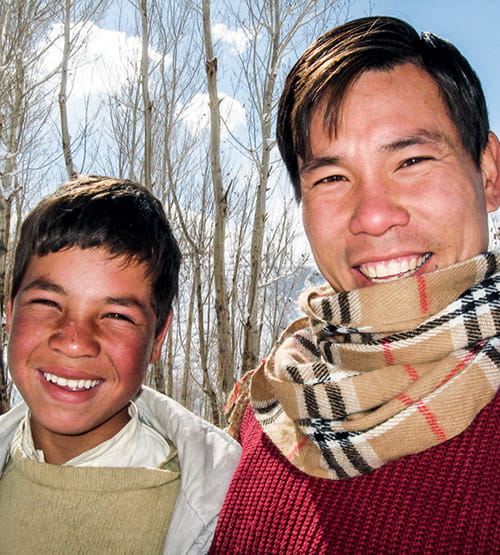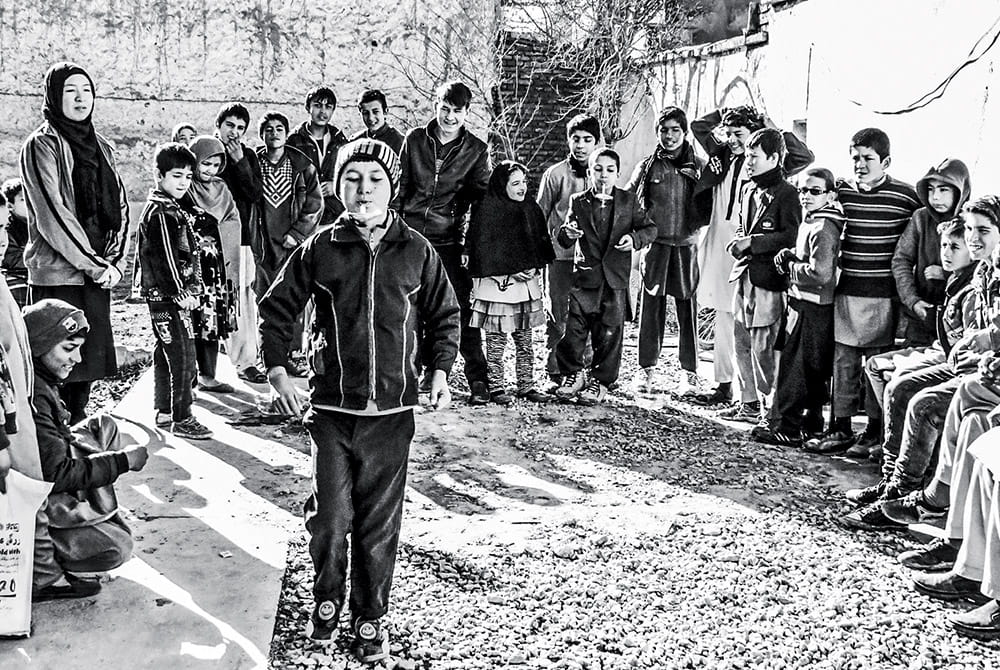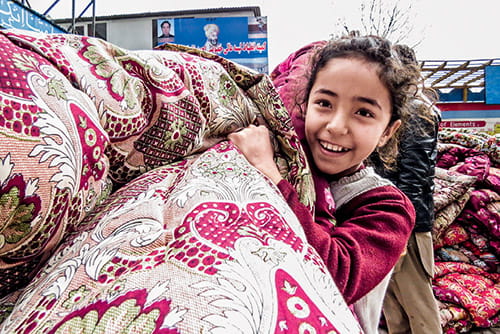Moved by the plight of those affected by armed conflict, Dr Wee Teck Young has spent the past 14 years helping the needy in Afghanistan and planting seeds of non-violence among the young.
BY ALY WIN CHEW
PHOTOS DR WEE TECK YOUNG
hen he was young, Dr Wee Teck Young used to cry when things did not turn out the way
he wanted. He recalls: “Once, when I was in kindergarten, I wasn’t happy with the way I had written a Chinese character. I tried so hard to erase the error that I created a hole in the paper.
 |
|
Dr Wee Teck Young (right) with Abdulai, a key member of APV. |
"My mother said, 'You could have accepted your imperfect but legible writing instead of destroying everything beyond recognition.'"
Her words have guided him in life. Today, Dr Wee, 47, has learnt to embrace the value in the imperfect and imprecise, having spent more than a decade in Afghanistan running humanitarian programmes to help those affected by the ongoing violence there.
Dr Wee has made such an impact that the Afghans call him “Hakim”, which means “learned one and local healer” in the local Dari language.
For his efforts, he received the International Pfeffer Peace Award – making him the only Singaporean recipient thus far – from the United States Fellowship of Reconciliation. The award honours those working for peace and justice around the world.
Before he moved overseas in 2002, Dr Wee ran his own general practice clinic in Singapore, living a comfortable life that he had worked hard to achieve. Then, the Sept 11 attacks happened in the United States in 2001.
When the War on Terror began, the plight of those affected by the incessant bombings in Afghanistan triggered something within him.
In 2002, he packed his bags for Pakistan, where he spent two years as a public health doctor in an Afghan refugee camp in Quetta, near the Pakistan-Afghanistan border. In 2004, he moved to the Afghan province of Bamiyan to work as a medical specialist for an international humanitarian non-governmental organisation (NGO).
In 2008, while facilitating a three-month peace workshop for 55 students at Bamiyan University, he found out that most of them believed they would not live to see peace in their country. But 16 of those students – all from different ethnic groups – believed otherwise, and decided to show that ethnic unity was possible by living together for a semester.
Their positive attitude inspired Dr Wee to form Our Journey To Smile, an NGO promoting non-violence, that same year. It was later renamed Afghan Peace Volunteers (APV).
“I do very small, concrete things to build alternative relationships and lifestyles; and I promote democratic ways of self-governance based on non-violent values. In short, I pursue the most powerful force in the world: love.”
Dr Wee Teck Young, Afghan Peace Volunteers founder
APV has since started a number of humanitarian initiatives in the war-ravaged country, such as the Borderfree Afghan Street Kids School, where volunteer teachers teach children Dari and mathematics as well as lessons on nature, humanity, and life. Starting with 21 students in 2013, the school now has 100 students enrolled. The 18 volunteer teachers are Afghan youth from all over the country.

With help from volunteers like Abdul Ali (tallest male in the background), Afghan Peace Volunteers (APV) has created a safe learning space for Afghan children.
APV also started the Winter Duvet Project in the winter of 2013. Using funds donated by international peace builders, it pays local women to sew duvets, which are then distributed to underprivileged and marginalised people in Afghanistan. To date, APV has distributed 9,000 duvets over three winters to the country’s poor.
MAKING A POSITIVE IMPACT
Abdul Ali, a 19-year-old student volunteer, coordinates the teams which manage APV’s accounts and micro-loan businesses. He first met Dr Wee in Bamiyan Province in 2009 and says that the latter’s message of non-violence has affected those around him. Ali, for instance, has learnt from Dr Wee how to find peace despite feeling sad and hopeless about his country’s situation.
“The most important lesson I’ve learnt from Hakim is to practise humanity, that every human being has a right to live a liberated life. I used to be a bit of a gangster when I first met Hakim, but it’s now been about five years since I fought with anyone,” he says.
“The Afghan Peace Volunteers and Hakim have made a positive impact. Take the 100 kids who attend the Borderfree School, for example. They are learning about non-violence for the first time in their lives in the midst of an ongoing war.”
Dr Wee is also spreading his message of peace beyond Afghanistan. In 2010, he established the Global Days of Listening programme, a Skype gathering held on the 21st day of every month that connects people from conflict zones around the world, including the Middle East and South America. Sharing their stories, the participants from North America, Latin America, Europe, Africa and South-east Asia form friendships.
The ties developed between APV and other peace groups around the globe have been vital in fostering international understanding, says Dr Wee.
“What is happening on the ground is different from what you read in the news or in books. Real relationships, not virtual ones, give the lie to the many stereotypes of and misinformation about Afghans and people living in war zones,” he says.

A young Afghan girl happily receives a duvet under APVʼs Winter Duvet Project.
The one common perception that is all too real, however, is the constant threat of danger. While he has never entertained the thought of giving up and returning to Singapore for good, Dr Wee admits that he and his volunteers often feel weary and are concerned that the organisation will one day meet its end because of the ongoing violence in the country.
While life in Kabul, where he now lives, can be tough, Dr Wee, who shares a rented apartment with Ali and five other volunteers, is content with its simplicity. He limits his Internet usage to an hour a day, just to keep abreast of current affairs and stay in touch with relatives in Singapore.
Once a week, he cooks for the local community and hand-washes his clothes. “I do very small, concrete things to build alternative relationships and lifestyles; and I promote democratic ways of self-governance based on non-violent values,” says Dr Wee.
“In short, I pursue the most powerful force in the world: love.”
